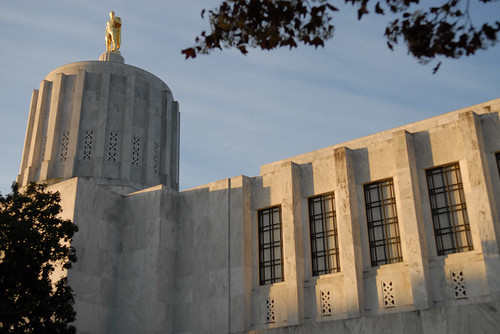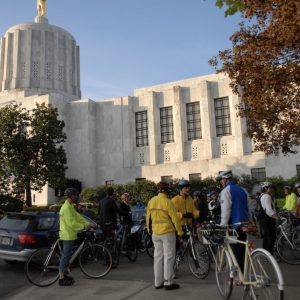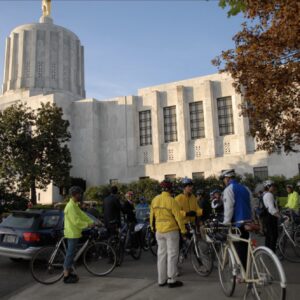The 2017 Oregon Legislative Session is well underway and we’re following as many bills as humanly possible (in a one-person newsroom).
Out of the thousands of bills swirling around the halls and meeting rooms of the state capitol building in Salem, there are few of particular importance to transportation reform advocates. Last week we shared the Senate bills we’re following and below are the House bills we’ve got an eye on…
House Bill 2355
Summary: “Directs Oregon Criminal Justice Commission to develop method for recording data concerning officer-initiated pedestrian and traffic stops” (Official overview)
Commentary: This bill is an effort to learn more about how racism and other biases of police officers manifest in traffic stops. “Profiling” is a national issue and one that is becoming even more of a concern now that cities across Oregon have embraced a “Vision Zero” plan for traffic safety. Those plans often call for new and/or improved enforcement practices; but while some see more enforcement as a key to safer roads, others see it as yet another reason to fear authority due to the color of their skin. We’ll be covering more about how this issue is playing out in Portland in a separate post.
Status: In Judiciary Committee, no meeting scheduled. Related: There’s an “End Profiling Listening Session” event being hosted by Unite Oregon tonight (2/21) in Hillsboro. Also read this recent Investigate NW/Portland Tribune story: Unequal Justice: The High Costs of Disparities for People of Color in Multnomah County.
House Bill 2409
Summary: “Authorizes city to operate camera mounted on street light or other appropriate place to record drivers who speed in excess of 10 miles over limit. Requires city to notify community and drivers of use of technology. Requires police officer to review photograph and sensor data before issuing citation. Provides registered owner of vehicle to whom citation is issued with ability to submit certificate of innocence or certificate of nonliability.” (Official overview)
Commentary: This bill is a key part of the City of Portland’s Vision Zero efforts and it’s also supported by law enforcement and safety advocates statewide. It would address a gap faced by law enforcement: They don’t have authority to ticket people for running a red light while using speed photo radar cameras and they can’t cite people caught on red light cameras for speeding. In a public hearing held last week Judiciary Committee members sounded supportive of the bill and there was no opposition testimony. It seems likely to pass.
Status: Hearing held in Judiciary Committee (2/16). No vote yet, pending some amendments.
Advertisement
House Bill 2440
Summary: Directs Department of Transportation to remove high occupancy vehicle lane restrictions on Interstate 5 in Portland. (Official overview)
Commentary: Sponsored by Rep. Julie Parrish (R-Tualatin/West Linn), this bill says ODOT, “may not restrict the use of any lane on Interstate 5 in Portland based on the number of occupants traveling in a vehicle.” We haven’t asked what motivated Rep. Parrish to sponsor this bill; but it seems odd that someone would want to discourage carpool/HOV lanes where congestion is at its worst.
Status: In Committee on Transportation Policy. No meetings scheduled.
House Bill 2461
Summary: “Establishes process for issuance of certificate of approval for operating autonomous vehicles.” (Official overview)
Commentary: It’s good to see Oregon seek to get out in front of any future progress in the autonomous vehicle realm. This bill would require that any AV manufacturer who wants to test their vehicles on Oregon roads must get a license and permission from ODOT before moving forward. Permission would only be granted when the manufacturer meets several requirements.
Status: In Committee on Transportation Policy. No meetings scheduled.
House Bill 2532
Summary: “Directs Oregon Transportation Commission to adopt rules establishing quantitative system for scoring and ranking transportation projects that are being considered by commission for inclusion in Statewide Transportation Improvement Program.” (Official overview)
Commentary: Sponsored by Rep. Jeff Reardon (D-Happy Valley), this bill is primarily the work of Transportation for America, a nonprofit group. They want more transparency and accountability from the Oregon Department of Transportation when it comes to selecting taxpayer-funded projects. The bill would also change how projects are scored and ranked internally in order to enshrine the importance of factors like “mobility,” “accesibility”, “economic vitality”, and “sustainability”. I see this bill as just another sign that ODOT is losing relevance and credibility with Oregonians. The agency is out of sync with the Oregon Transportation Commission (its governing body) and there seems to be a growing sense that ODOT’s perspective on transportation needs a major overhaul. Given the special interests (internal and external) that want to preserve the status quo at ODOT, this bill faces a very uphill battle.
Status: In Committee on Transportation Policy. No meetings scheduled.
House Bill 2597
Summary: “Defines “mobile electronic device.” Provides for suspension of execution of fine for first offense if person completes distracted driving avoidance course. Increases penalty for offense. Further increases penalty if offense contributes to accident or is second or subsequent offense. Punishes by maximum fine of $2,000.” (Official overview)
Commentary: This is one of two major distracted driving bills this session. The other one (Senate Bill 2) carries much harsher penalties and no one thinks it will pass in its current form. This house bill is much more lenient (maximum fine of $2,000 instead of $6,250) and it includes a diversion program. But it would still tighten up Oregon’s “distracted driving” law by getting rid of some exceptions and expanding the definition of use to “for any purpose”. With so much attention and political inertia behind distracted driving and with already considerable support from legislators, this bill is very likely to pass. And it should! We really need to clean up our laws around use of electronic devices.
Status: In Judiciary Committee. No meetings scheduled. UPDATE: Public hearing and possible work session (vote) scheduled for 2/27.
House Bill 2667
Summary: “Establishes Task Force on Vision Zero: Achieving Zero Traffic Crashes, Injuries and Fatalities.” (Official overview)
Commentary: As we reported last week, this bill is making lawmakers come face-to-face with the realities of the carnage on Oregon roads. While ODOT has safety committees and plans already, there’s a sense from advocates and activsts that they aren’t doing enough — and not doing it with the right priorities and perspective. “There’s a feeling that ODOT can’t do it alone right now,” is how Stephanie Noll, interim leader of The Street Trust, put it last week. This bill is the result of a push from The Street Trust to move the Vision Zero conversation forward at the state level. At its first public hearing last Wednesday, no vote was taken so that some of the language in the bill could be tweaked. There is significant concern at ODOT that this task force would duplicate existing efforts, so it’s unclear whether they’ll be able to meld Vision Zero into their work or if they’ll endorse a plan to have a parallel task force. The former might be too progressive for ODOT right now and the latter would be inefficient and would make ODOT’s other efforts look outdated. Something’s got to give.
Status: Public hearing held on 2/15 but no vote has been taken.
House Bill 2682
Summary: “Authorizes cities and counties, by process established by rule, to establish designated speed for certain highways without first seeking approval from Department of Transportation.” (Official overview)
Commentary: This bill is a top legislative priority for the City of Portland. It’s part of their ongoing effort to tame traffic and make roads safer by taking more control over local roads. As we reported last month, this bill is very simple: In the existing law that governs speed limit changes, it would change the word “department” (referring to ODOT) to the much more general “road authority” thereby giving cities and counties the ability to change speeds without state oversight (as long as required enginerring analyses had been completed of course). We’ve heard that the bill is undergoing some changes because not all cities are interested in having this authority.
Status: In Judiciary Committee. No meeting scheduled.
House Bill 2683
Summary: “Directs Department of Transportation to remove directional sign on Southeast Powell Boulevard between Southeast 20th Avenue and Southeast 21st Avenue in Portland.” (Official overview)
Commentary: This is a strange bill that exists for no other reason than to force ODOT to remove a sign on Powell Blvd that directs people off that major arterial onto SE 17th. We’re following this because activists with BikeloudPDX brought it to our attention. They say the sign encourages people to avoid traffic on Powell and use neighborhood side streets in inner southeast Portland instead. For background read this story in the Portland Tribune.
Status: In Transportation Committee. No meeting scheduled.
Don’t forget to check our companion post about Senate bills worth following. Stay tuned for more coverage of these bills — and other legislative action — as the session continues.
— Jonathan Maus: (503) 706-8804, @jonathan_maus on Twitter and jonathan@bikeportland.org
BikePortland is supported by the community (that means you!). Please become a subscriber or make a donation today.







Thanks for reading.
BikePortland has served this community with independent community journalism since 2005. We rely on subscriptions from readers like you to survive. Your financial support is vital in keeping this valuable resource alive and well.
Please subscribe today to strengthen and expand our work.
Jonathan, regarding the Vision Zero bill you report that, “There was considerable concern among Judiciary Committee members that it would duplicate existing ODOT efforts,…” and I’m curious which legislators expressed this concerned. Also, HB 2667 was heard in the House Committee on Transportation Policy, not Judiciary.
Hi Gerik,
Thanks for the comment. I had to re-check my notes from the hearing. And you’re right. I don’t see “considerable concern” among committee members. I have edited the story slightly. I want to convey that the idea of duplication of efforts is a big concern of ODOT and it is on the radar of the committee and other key interest groups. Rep. Nosse mentioned it in his testimony when he said (paraphrasing), “I’m aware ODOT has a traffic safety plan… I see no reason these couldn’t be merged in some way.” And the reps who testified from the League of Oregon Cities and the Association of Oregon Counties both mentioned it as well.
Thanks for your quick response, Jonathan. I’m glad to see that ODOT is formally neutral on the bill and I hope everyone who is working on transportation safety comes to agree that more community involvement will help build political support for safe streets.
Great Summary, Jonathan! I found an amusing typo in the write-up for HB 2682: “enginerring”
House Bill 2409 sounds good, but it might be more effective in bringing excessive speeds down, if it recorded and cited people that drove in excess of 5 miles per hour over the speed limit, rather than 10 miles per hour over the speed limit.
10 mph over the speed limit, particularly for example, in the case of lower posted speed limits like a 25mph or 20 mph limit on a neighborhood street, or school zone, would be a huge jump in speed, with a correspondingly undesirable effect on the neighborhood. If there’s a chance the bill could pass with an excess of 5mph over the limit, I’d hope the legislators give it a try.
Even on roads posted for 40mph, it seems to me that maintaining the vehicle’s speed at no more than 5mph over, is not a very difficult thing to do. This is based on my own personal experience driving, and when driving, taking note of other people around me on the road, essentially maintaining speeds no more than 5 mph over.
agreed that 10 mph is too much of a buffer… on a 40 mph street you have to be going over 50, 25% higher than the limit… that’s ridiculous… to me even 5 mph is too much room… it’s not difficult to stay under the limit… I’d like to see the majority of people going 5 mph under the limit and only the crazy people pushing it at exactly the limit…
Does seem to make more sense as a percentage. Funny to me that American society is still stuck on this “10 MPH over.” My understanding is that it dates back to arguments about the calibration tolerances of early speed radar equipment, oh so long ago. (Frankly I wish I was too young to remember that… ).
My own personal experience seems to indicate quite definitely that the calibration, of at least the portable speed reader boards (the ones on wheels the police can haul behind a car.), are likely very accurate…easily within a mile or two of what my nearly 25 year old pickup’s speedometer reads when I pass by the reader board on Jay St through Nike’s campus. The accuracy could even be closer than I’ve suggested. If my car had a digital speedometer, like the speed reader board does, I’d have a better idea.
Maintaining a vehicle speed of no more than 5mph in excess of the speed limit, is not very difficult, from my own experience driving in posted speed limit zones ranging from 25 mph and 40 mph. I can easily, with a minimum of attention given to the speedometer reading, keep the vehicle at no more that 3mph in excess. Though there are occasions when I somewhat inadvertently have the vehicle speed rise a bit higher, which is why I suggest 5 mph over, for latitude. Myself, inadvertently or deliberately, allowing my vehicle to travel 6 mph over is rare. Allowing people 10mph in excess, seems to me an invitation to sloppy driving. Or ‘careless’.
I’m just reflecting on all of this, and presenting it here as a rule of thumb that might be used to have a sense of what could possibly be a reasonable mph excess condition for issuing citations. There likely are people with different ideas about what should be a basis for reasonable excess over the posted speed limit…they should certainly present their ideas about that.
House Bill 2440: people think the carpool lane creates all the traffic in the other lane so they want it removed so they can go faster…
they don’t realize that removing the lane won’t improve their commute times… but it’ll disadvantage the very people we should be encouraging, the real carpoolers…
The problem with Portland’s HOV lane is that it doesn’t work as intended– when I’m sitting in traffic in my SOV, most of the people using that lane are also SOVs. I never seen enforcement, so nothing changes.
Seems a universal truth these days. So much incentive and not enough dissuasion to obey HOV laws (so apparently let’s just get rid of them!). I recently got video of a residential street near my house frequently used as a cut-through from an expressway. There’s a sign saying “special enforcement area”, a 25 MPH road where people are consistently driving at 40+ MPH at rush hour, and very convenient hiding place for the CHP motorcycle cop who literally has his back to that street (and sign) while ticketing SOV drivers in the HOV lane on that expressway. (video’s not uploaded online yet, sorry).
Irony is that there’s a picture of a moto cop on that “special enforcement” sign! But the residential street is under Santa Clara jurisdiction but San Tomas is state.
https://goo.gl/maps/51AxYQgLugM2 (and yes those are sharrows).
Weird, HB 2597 was sponsored by Peter Buckley, who didn’t seek re-election last year. Seniority has a huge part in which bills get out of committee, on to the floor, and to the guv’s desk. Hopefully his retirement doesn’t lower the chances of this bill passing.
No chance for studded tire fees this session?
Nor for a ban.